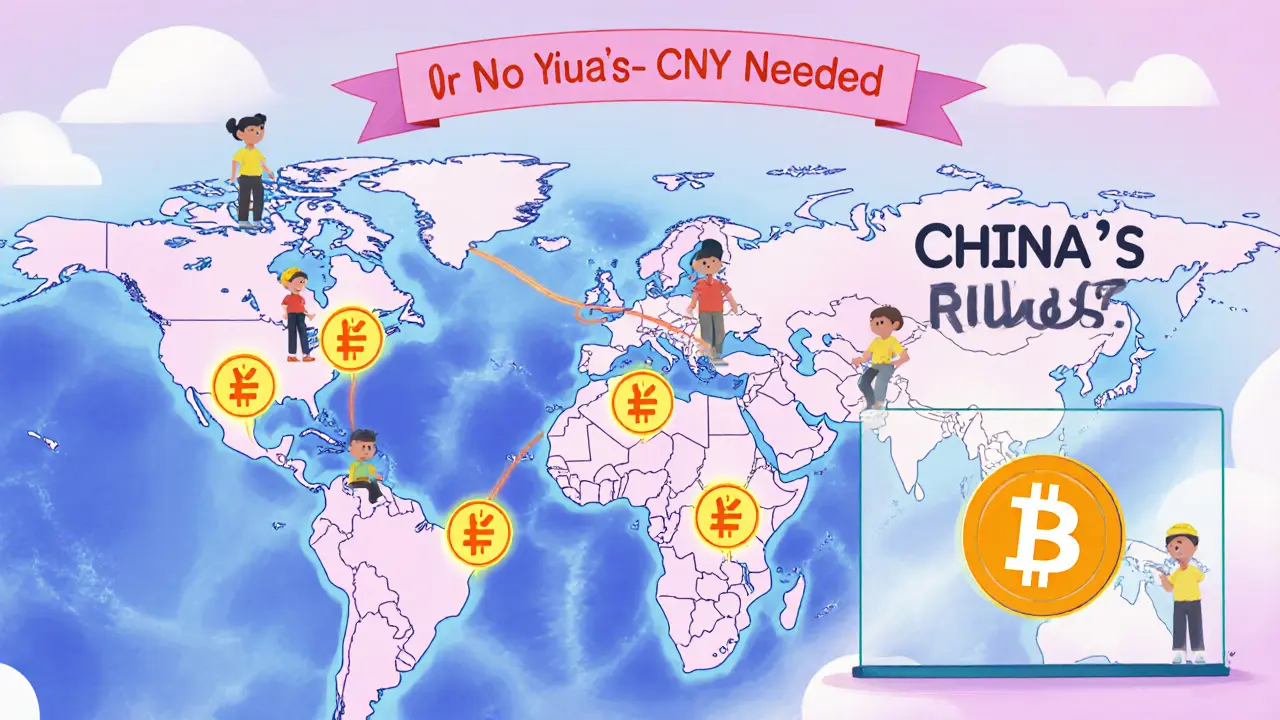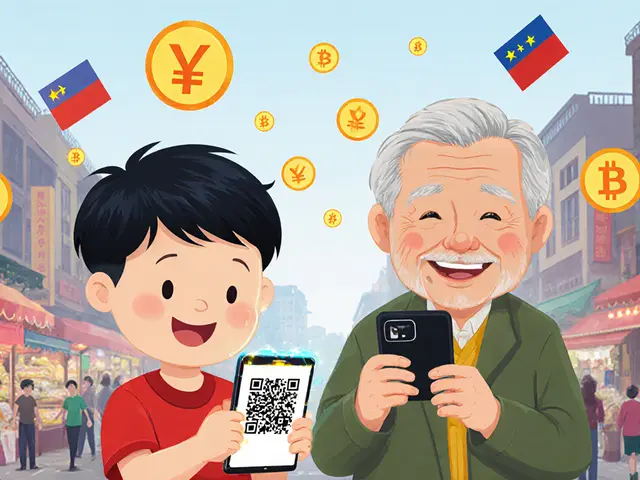China doesn’t want you to use Bitcoin. Not because it’s too risky, or too volatile, but because it can’t control it. That’s the core of its digital currency strategy - replacing decentralized crypto with something the government can track, freeze, and direct. Enter the e-CNY, or digital yuan. Launched in trials back in 2019, it’s now the backbone of China’s plan to shut down private cryptocurrency use and rebuild its monetary system from the ground up - all under one roof: the People’s Bank of China.
What Is the E-CNY, Really?
The e-CNY isn’t a new kind of money. It’s the Chinese yuan, but digital. Think of it like cash you carry in your phone - except every transaction is recorded, monitored, and controlled by the state. Unlike Bitcoin, which runs on a public, decentralized ledger, the e-CNY lives on a system owned and operated entirely by China’s central bank. There’s no mining. No blockchain in the public sense. No anonymous wallets. Just a digital version of the same currency you use to buy groceries, pay rent, or take the bus. By mid-2024, over 7.3 trillion yuan ($1 trillion USD) had moved through the e-CNY system. That’s not small change. It’s more than the entire market cap of Bitcoin at its peak. The government didn’t wait for adoption - it forced it. Civil servants in dozens of cities now get paid in digital yuan. McDonald’s, Starbucks, and subway stations all accept it. Even elderly citizens who never used smartphones before are learning to scan QR codes with their government-issued digital wallets. And here’s the catch: you don’t need a bank account to use it. That’s the big sell. But you do need to register your ID. Every wallet is tied to your real name, phone number, and government records. If the state decides you’ve broken a rule - maybe you bought something on a blacklisted site, or sent money to someone flagged as suspicious - your wallet can be frozen. No appeal. No blockchain dispute. Just silence.Why Bitcoin Doesn’t Stand a Chance in China
Bitcoin is the opposite of everything the Chinese government wants. It’s borderless. It’s uncensorable. It’s anonymous. And most of all - it’s out of their hands. In 2021, China banned all cryptocurrency trading and mining. Mining farms were shut down overnight. Exchanges like Binance and OKX were forced to exit the country. Anyone caught trading Bitcoin faced fines, jail time, or both. The crackdown wasn’t just about financial control - it was about ideology. The state sees decentralized money as a threat to its authority. If people can move wealth without permission, they can also evade taxes, sanctions, or capital controls. And in a country that tightly manages how money flows in and out, that’s unacceptable. China’s regulators don’t just block access - they hunt it. Law enforcement uses on-chain analytics to trace Bitcoin transactions, even when users try to hide behind VPNs. Wallets are monitored for patterns: large transfers, frequent small payments, connections to overseas exchanges. If your wallet looks like it’s trying to bypass the system, you get flagged. And once flagged, your bank accounts, mobile payments, and even travel records can be scrutinized. Meanwhile, Bitcoin’s global market cap hovers around $500 billion. It’s used by millions worldwide. But inside China? It’s invisible. Not because people don’t want it - surveys show 26% of investors in Greater China still plan to buy crypto ETFs in 2025 - but because the cost of getting caught is too high.
Control vs. Freedom: The Core Difference
The e-CNY and Bitcoin aren’t just different technologies. They’re different philosophies. Bitcoin was built to remove intermediaries. No banks. No governments. No middlemen. Transactions happen peer-to-peer, verified by a global network of computers. The supply is capped at 21 million coins. That scarcity is part of its appeal. It’s digital gold. The e-CNY was built to add control. Every transaction is logged. Every user is known. The government can set spending limits, expire digital coupons, or restrict payments to certain merchants. It can even pause transactions during holidays or emergencies. There’s no limit to how much can be printed - because it’s just yuan, digitally wrapped. The supply is whatever the central bank decides. Privacy? On Bitcoin, your wallet address is public, but your identity isn’t. On the e-CNY, your identity is the wallet. There’s no pseudonymity. No anonymity. Even offline transactions - those that work without internet - still leave a digital trail that syncs back to the central system the moment you reconnect. Energy use? Bitcoin mining consumes more electricity than entire countries. The e-CNY runs on China’s existing power grid and payment infrastructure. It doesn’t need massive data centers. It doesn’t need proof-of-work. It needs servers. And China has plenty.China’s Global Play: Exporting the Digital Yuan
China isn’t just building a digital currency for its own people. It’s building a model for the world. Through the Belt and Road Initiative, China is pushing the e-CNY into trade corridors in Africa, Central Asia, and Southeast Asia. Countries with weak financial systems or limited access to U.S. dollars are being offered a simple deal: use the digital yuan for cross-border trade, and you get better financing, faster payments, and less reliance on Western banks. The mBridge project - a joint effort with the Bank for International Settlements - is testing how multiple central banks can settle payments directly using their own digital currencies. No SWIFT. No dollar intermediaries. No American oversight. This is De-Dollarization 2.0. Hong Kong, though semi-autonomous, is playing along. Since August 2024, all stablecoins pegged to the Hong Kong dollar must be fully backed by reserves - no algorithmic tricks, no hidden risks. It’s a clear signal: if you want to operate in China’s financial orbit, you play by its rules. Meanwhile, the U.S. and Europe are still debating whether to launch their own CBDCs. China is already using its.
Who Benefits? Who Loses?
For the Chinese government, the benefits are clear: total monetary control, reduced illicit finance, better fiscal policy, and a tool to bypass Western sanctions. For businesses? Easier payments. Lower fees. No chargebacks. Merchants love it. For ordinary citizens? Convenience, yes. But also surveillance. There’s no opt-out. If you want to buy food, pay rent, or get a government subsidy, you use the e-CNY. There’s no cash alternative anymore in many cities. For Bitcoin users? They’re being pushed out. Not by force alone - by isolation. No exchanges. No ATMs. No legal way to convert. Even peer-to-peer trading is risky. The state doesn’t need to ban it everywhere - it just needs to make it too dangerous to use. And for the rest of the world? China is showing that a digital currency doesn’t have to be open or decentralized. It can be efficient, fast, and totalitarian.The Future Is Digital - But Who Controls It?
China’s e-CNY isn’t just a payment app. It’s a new kind of state power. One that can track your spending habits, predict your behavior, and restrict your freedom - all under the guise of modernization. Bitcoin promised financial freedom. China’s answer is financial order. The world is watching. Other nations are asking: Do we want the convenience of a state-backed digital currency? Or do we want the openness of crypto? There’s no middle ground. You can’t have both.Is Bitcoin illegal in China?
Yes. Since 2021, all cryptocurrency trading, mining, and exchange services have been banned in China. While holding Bitcoin privately isn’t explicitly illegal, using it to make payments, transfer value, or trade is. The government actively blocks access to crypto exchanges, monitors wallet activity, and punishes violations with fines or imprisonment.
Can I use Bitcoin in China today?
Technically, you might still hold Bitcoin in a private wallet, but you can’t legally spend it anywhere. No stores, restaurants, or services accept it. No banks process crypto transactions. Even peer-to-peer trades are risky - law enforcement tracks wallet addresses and can freeze accounts linked to suspected crypto activity. Using VPNs to access foreign exchanges also increases your risk of being flagged.
How is the e-CNY different from WeChat Pay or Alipay?
WeChat Pay and Alipay are private payment platforms that move money from your bank account. The e-CNY is actual digital currency issued by the central bank. It’s not a payment app - it’s the money itself. Even if your phone dies, you can still pay with the e-CNY using NFC or offline QR codes. And unlike WeChat Pay, the government can freeze, limit, or audit your e-CNY wallet directly - no need to go through a private company.
Does the e-CNY use blockchain technology?
Not in the way Bitcoin does. The e-CNY uses a permissioned, centralized ledger controlled by the People’s Bank of China. While it may use some blockchain-inspired components for efficiency, it doesn’t rely on decentralization, mining, or public verification. Transactions are processed through government servers, not distributed nodes. The goal isn’t transparency - it’s control.
Why is China pushing the e-CNY so hard?
China wants full control over its monetary system. By replacing cash and private digital payments with a state-backed currency, it can track every transaction, enforce capital controls, prevent money laundering, and reduce reliance on the U.S. dollar. It also gives the government new tools to stimulate the economy - like sending targeted digital coupons or cutting off spending to certain groups. This level of control isn’t possible with Bitcoin or other cryptocurrencies.
Is the e-CNY being used outside China?
Yes, but only in limited pilot programs. China is testing cross-border e-CNY payments in countries involved in the Belt and Road Initiative - including Thailand, the UAE, and parts of Africa. These trials aim to help foreign businesses trade with China without using the U.S. dollar or SWIFT. It’s part of a broader effort to create a global financial system that bypasses Western institutions.
Can I buy e-CNY as a foreigner?
Not easily. The e-CNY is only available to Chinese citizens and residents with a valid ID. Foreigners can use it in China during short visits if they register a wallet through approved banks or apps, but they can’t hold it long-term or transfer it out of China. The system is designed for domestic use, with international expansion still in early testing.



taliyah trice
November 22, 2025 AT 03:04China just made cash obsolete and no one blinked
They didn't ask for permission, they just did it
Peter Mendola
November 23, 2025 AT 14:19This is dystopian efficiency. 🤖
Bitcoin’s freedom is a luxury no state can afford.
China wins. Period.
Sunita Garasiya
November 23, 2025 AT 18:41So let me get this straight - you’re mad because a government finally figured out how to stop people from using money like a hacker fantasy?
Bitcoin was never money. It was a cult with a whitepaper.
And now China’s giving people a better tool. Who’s the real villain here?
Mike Stadelmayer
November 24, 2025 AT 16:59I used to think crypto was the future
Now I see it was just a distraction
Real power isn’t in decentralization
It’s in control
And China’s playing 4D chess while the West argues about ETFs
neil stevenson
November 26, 2025 AT 09:35Just saying - if your phone dies, you’re screwed with e-CNY
With Bitcoin? You’ve got a paper wallet in your sock drawer 😅
Convenience vs. survival mode
Samantha bambi
November 26, 2025 AT 19:17The fact that China can freeze your wallet because you bought a banned book…
That’s not innovation
That’s digital authoritarianism wrapped in a QR code
Anthony Demarco
November 27, 2025 AT 12:22They’re not replacing Bitcoin
They’re replacing the idea that money should be free
And honestly? Most people don’t care
They just want their food delivered without a glitch
Control is the new convenience
And we’re all just along for the ride
Lynn S
November 27, 2025 AT 16:09It is not a question of whether the e-CNY is efficient - it is a question of whether a society that permits such total financial surveillance can be called free.
And the answer is no.
Not even close.
Jack Richter
November 28, 2025 AT 04:02Yeah okay
But can you use it to buy weed?
sky 168
November 28, 2025 AT 14:45My grandma uses e-CNY now
She doesn’t know what blockchain is
She just knows she can pay for her pills without waiting in line
That’s not control
That’s care
Devon Bishop
November 29, 2025 AT 03:25Biggest thing people miss - e-CNY doesn’t need internet to work
It’s NFC, QR, even paper tokens
China’s thinking ahead
Not like the West still arguing if CBDCs are ‘safe’
They’re already using it
sammy su
November 29, 2025 AT 11:48Look, I get why people love bitcoin
But when your rent is due and your wallet gets frozen because you talked to someone flagged by the state…
That’s not freedom
That’s fear
And honestly? Most folks just want to live without being hunted by their own money
Khalil Nooh
November 29, 2025 AT 20:07China isn’t trying to win a crypto war.
They’re rewriting the rules of money itself.
Bitcoin was a protest.
e-CNY is the new government.
And guess what? The protest didn’t matter.
Because the system moved on without it.
jack leon
November 30, 2025 AT 03:42Imagine a world where your spending habits are monitored like a Netflix algorithm
Where the state decides if you can buy a book, a bike, or a birthday cake
That’s not digital currency
That’s digital tyranny with a user-friendly interface
And they call it progress?
Chris G
November 30, 2025 AT 14:06Bitcoin is dead in China
And it’s not because of force
It’s because no one wants to risk jail for a meme coin
Practicality beats ideology every time
Phil Taylor
November 30, 2025 AT 19:12Westerners whine about ‘freedom’ while their banks charge 5% to send money overseas.
China offers instant cross-border payments with zero fees.
Who’s really the oppressor?
Hint: It’s not the one building the system.
diljit singh
December 1, 2025 AT 22:13Bitcoiners are like people who think horse carts are better than Tesla
They’re not wrong
They’re just not living in the same century
And now China’s got the whole highway
While you’re still arguing about the wheel
Abhishek Anand
December 2, 2025 AT 19:12The real tragedy isn’t that China controls the e-CNY
It’s that the world is watching and still asking if they should copy it
We’re not debating technology
We’re debating whether we still believe in liberty
And the answer is… we’re not sure anymore
vinay kumar
December 3, 2025 AT 21:48Why are you surprised
China always wins
They don’t play games
They just build
Chris Popovec
December 5, 2025 AT 20:27They’re not just tracking transactions
They’re mapping your soul
Every purchase = a data point
Every refusal = a red flag
Soon your e-CNY will decide if you get a job, a loan, or a visa
It’s not money
It’s a social credit system with a payment app face
Lara Ross
December 7, 2025 AT 18:17Let’s not romanticize Bitcoin.
It never helped the poor.
It never paid for groceries.
It never funded a hospital.
e-CNY does.
And for the first time, a digital currency is serving real people - not speculators.
That’s not evil.
That’s evolution.
Leisa Mason
December 9, 2025 AT 14:57Wow. So we’re supposed to be impressed that a dictatorship invented a better payment app?
Let me know when they start letting people vote with their wallets.
Until then, this isn’t innovation.
It’s a prison with a digital keypad.
Rob Sutherland
December 10, 2025 AT 10:47What if the real question isn’t who controls the money
But whether we still want to be controlled at all?
Bitcoin was a cry for autonomy.
e-CNY is the sound of silence.
And we’re all just learning how to live without asking why.
Tim Lynch
December 11, 2025 AT 20:26There’s a quiet horror in how easily people accepted this.
No protests.
No riots.
No hashtags.
Just QR codes.
One generation grew up believing in decentralized freedom.
The next just wants their food delivered.
And the state? It didn’t need to crush Bitcoin.
It just waited for us to forget why it mattered.
Marilyn Manriquez
December 12, 2025 AT 06:06As someone who grew up in a country where money meant freedom
I see the beauty in China’s system
It’s not about control
It’s about inclusion
Millions without bank accounts now have access to the economy
Yes, the state sees everything
But it also protects everything
That’s not tyranny
That’s responsibility
Terry Watson
December 12, 2025 AT 13:13Imagine if the U.S. had done this instead of letting Silicon Valley turn crypto into a casino…
Imagine if our government had built a digital currency that reached every elderly person, every rural farmer, every undocumented worker…
Instead, we let hedge funds buy Bitcoin and call it innovation.
China didn’t just win the race.
They built the track.
Norm Waldon
December 14, 2025 AT 03:25They’re using this to track dissidents. They’re using this to silence minorities. They’re using this to prevent anyone from fleeing the system.
This isn’t a currency.
This is a surveillance weapon disguised as convenience.
And if you think it won’t come here… you’re already being watched.
sammy su
December 15, 2025 AT 05:32Just read this comment again
My grandma uses e-CNY
She’s 78
She never had a bank account
Now she pays for her medicine without asking anyone
That’s not control
That’s dignity
And you’re mad because they didn’t use blockchain?